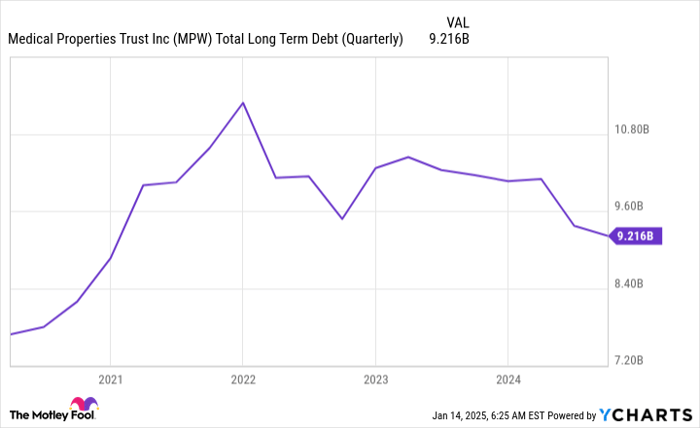Medical Properties Trust: Buy, Sell, Or Hold?

The big draw with regard to Medical Properties Trust (NYSE: MPW) today is its lofty 8% dividend yield. But this is a signal of a high level of risk in what amounts to a turnaround story, as the real estate investment trust (REIT) continues to deal with troubled tenants. It is having some success on that front, but is Medical Properties Trust stock worth buying?
The case to sell Medical Properties Trust
Getting the bad news out of the way first: Medical Properties Trust has been dealing with some really difficult business events. For example, two of the REIT's largest tenants have filed for Chapter 11 bankruptcy protection in the last couple of years. The most recent filing came in early January 2025. So the headwinds aren't over yet.
Where to invest $1,000 right now? Our analyst team just revealed what they believe are the 10 best stocks to buy right now. See the 10 stocks »
Image source: Getty Images.
The ongoing problems have been so bad that Medical Properties Trust cut its dividend -- not once, but twice. In 2023, the dividend fell from $0.29 per share per quarter to $0.15. And then in 2024, it fell again to $0.08, for a total drop of just over 70%. Not surprisingly, the stock has lost more than 80% of its value over the last three years.
This is not the right stock for investors who like to sleep well at night. While it appears that the worst news is out, the struggle to deal with the problems isn't yet over. And if another tenant faces problems, Medical Properties Trust's potential turnaround could be pushed further out. Even if everything goes as planned from here, a material upturn in performance is likely to be years away.
Yes, the dividend yield is high, but for most dividend investors, it probably won't be worth the risk. Selling or never buying will be the right call.
The case to hold Medical Properties Trust
If you have held on to Medical Properties Trust through this difficult period, you have a choice to make: You could sell the shares and capture the loss to offset gains elsewhere in your portfolio. However, the REIT has made some progress as it looks to reposition for the future. Thus, you could also justify sticking around, since there is finally a light at the end of the tunnel.
Notably, in 2024, Medical Properties Trust was able to take back some of the properties operated by one of its bankrupt tenants. Those properties have been leased to another operator. The rent rate is set well below previous levels, but it will rise over the next couple of years until it is at about 95% of the previous level. The early-2025 bankruptcy filing, meanwhile, is likely to further improve Medical Properties Trust's outlook, though that process is still ongoing.
If you believe strongly that Medical Properties Trust has hit an inflection point and don't mind sitting on capital losses for what could be a long time, there's probably no harm in holding on. After all, given the massive price decline that has already taken place, your position is probably not nearly as meaningful as it once was to your overall portfolio. That said, dividend investors will have to come to grips with the fact that, despite the high yield, the stock isn't generating the kind of income that it used to.
The case to buy Medical Properties Trust
Buying Medical Properties Trust rests on the same logic as holding it. You have to believe strongly that this healthcare REIT has turned an important corner. Or, perhaps, things couldn't possibly get any worse. Either way, buying this financially troubled, dividend-cutting REIT can only be justified if you expect the future to be brighter than the recent past.
MPW Total Long Term Debt (Quarterly) data by YCharts
There are some reasons for optimism. The new tenants, for example, suggest that rental income could head higher over the next couple of years. And all the moves being made during the two bankruptcy processes, along with Medical Properties Trust's other actions, have resulted in an improving balance sheet position. The question is whether this is enough of an indication of improvement to warrant buying the stock.
For aggressive investors, it might be, particularly given the lofty yield. While it could be a very long time before the dividend gets back to pre-cut levels, improving business performance could, eventually, lead to dividend growth again. But investors have to go in with their eyes wide open here: Medical Properties Trust is still a high-risk turnaround story.
Most investors will want to wait for further progress
All in, if you are a conservative dividend investor attracted to the high yield Medical Properties Trust is offering, you should probably hold off on buying it. The bad news isn't over yet, and the situation that led to two dividend cuts in two years is still playing out. Only aggressive investors willing to take on a high-risk turnaround stock should probably hold or buy this stock.
Should you invest $1,000 in Medical Properties Trust right now?
Before you buy stock in Medical Properties Trust, consider this:
The Motley Fool Stock Advisor analyst team just identified what they believe are the 10 best stocks for investors to buy now… and Medical Properties Trust wasn’t one of them. The 10 stocks that made the cut could produce monster returns in the coming years.
Consider when Nvidia made this list on April 15, 2005... if you invested $1,000 at the time of our recommendation, you’d have $818,587!*
Stock Advisor provides investors with an easy-to-follow blueprint for success, including guidance on building a portfolio, regular updates from analysts, and two new stock picks each month. The Stock Advisor service has more than quadrupled the return of S&P 500 since 2002*.
*Stock Advisor returns as of January 13, 2025
Reuben Gregg Brewer has no position in any of the stocks mentioned. The Motley Fool has no position in any of the stocks mentioned. The Motley Fool has a disclosure policy.



